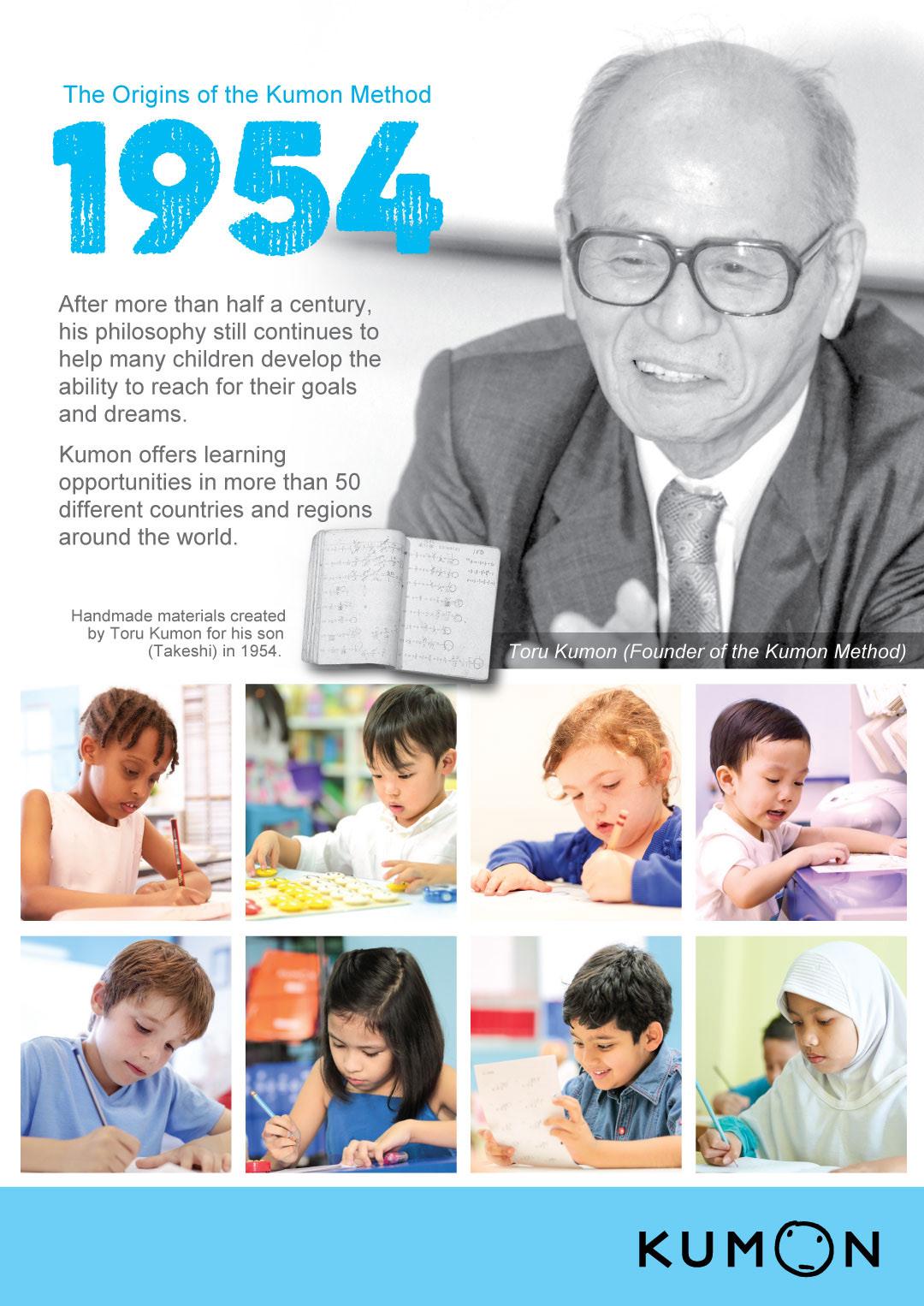AN EXTRAORDINARY BOY
Mohd Umair Bin Mohd Marzaini


Mohd Umair Bin Mohd Marzaini


Lim Oscar and Lim Elise

Welcome to the first issue of Potential Magazine 2023!

As we are heading into 2023, Kumon Malaysia is excited to power up in today’s world of digitalisation. We are currently transitioning to Kumon learning via tablets, with the aim of improving the overall learning experience. Students would be able to use the ‘daily marking’ function on this platform, allowing them to assess their progress in real-time! Stay tuned as we share more details with you on this new digital tool, as we’re certain that this digitalisation efforts will definitely improve the overall value that the Kumon Method brings to our students.
In this issue, we have two success stories to share and inspire all of our students. The first is Muhammad Uzair, a twelve-year-old boy who believes that Kumon has helped him overcome many challenges –personally and academically. The second is the story of two siblings, Lim Oscar and Lim Elise. Together with their parents, they will share how Kumon has helped them acquire skills that would help them to continue learning, even outside of the classroom.
For every student, recognition is critical as it serves as an acknowledgement of progress as well as motivation for them to achieve greater heights. Do read about our awards and recognitions available through the Kumon Programme on page 10.
Do remember to follow us on Facebook @KumonMalaysia and Instagram @KumonMalaysia for the latest Kumon news! And contact us at information @kumon.com.my if you have any questions about our learning programmes. We’d love to hear your ideas and also inspiring stories you have! We hope that the New Year brings you a fresh start, filled with opportunities and achievements! With Love & Respect, Public Relations Team Kumon Malaysia

Mohd Umair Bin Mohd Marzaini, also known as Umair among his family members, is a 12-year-old Kumon student from Pulau Pinang. He shared that he was truly nervous when he first joined the Kumon programme. He wishes to improve his maths skills and knows that Kumon can help him with his schoolwork because he has seen his siblings excelling in their maths subject through the Kumon programme. As he progressed in the learning journey with Kumon, he learned how to prioritise his homework, whether it was Kumon or school homework. He shared, “Because I’ve been doing Kumon daily worksheets since I was a child, I learned self- discipline and now have the ability to manage my time efficiently in my daily life.” At school, he is active in sports and has joined the football and ping pong teams.
Name : Mohd Umair Bin Mohd Marzaini
Age : 12 years old
Achievement : 3 years advanced in Maths
Ambition : Biologist
Aside from athletics, he participated and competed in robotics at national level competitions, since he was in primary four until now. He began at the state level and worked his way up to the national level. In these competitions, he needed to come out with the best coding and programming to mobilise the robot, which he learned through joining the school’s coding club.. He aspires to be a biologist because he enjoys everything to do with animals. His passion began when he was a child, as he enjoyed reading books about animals.
Puan Azhana, Umair’s mother, stated that she first discovered about Kumon from a social media advertisement. Her daughter struggled to remember the multiplication table when they returned from the United Kingdom in 2016. That’s when she decided to enrol three of her children in the Kumon programme. After years of Kumon, she now feels relieved and proud when her children were able to perform far above their school grade level. “Kumon has a unique method that will help children learn better. I also like Kumon’s award system because it helps to motivate them – much like a morale booster for them when they’re down. I’m certain that Kumon has improved my children’s abilities not only academically but in other areas as well,” she shared. In sharing about how she disciplines her children at home, Puan Azhana said that she limits the use of gadgets at home. “We don’t have television at home! For me, having too many gadgets at home makes children reluctant to go out and explore the world, and it may also affect their emotions.” Puan Azhana always encourages her children to help with housework such as hanging clothes, vacuuming the house and watering the plants. “Each of my children will have their own housework that they need to do. I instil this habit in them from a young age. For me, once they have completed their housework, they can do whatever they want, especially reading,” she continued.
Puan Azhana concluded by saying that she is very pleased with the positive impact of the Kumon programme on her children. She acknowledges that each child has unique abilities and that it is a bonus if some children can adapt and progress more quickly than others. What’s most important is to trust the process!
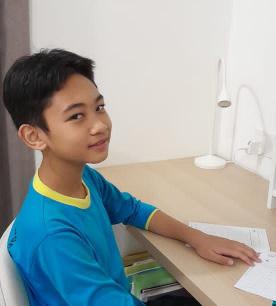
Meet two siblings, Lim Oscar and Lim Elise, who are nine and seven years old respectively and are two of the many successful Kumon students. Since they embarked in the Kumon programme in 2020, they have progressed well and are now learning maths materials that are five years ahead of their peers at school. In the beginning, they have assumed that the Kumon programme can only teach them maths. Eventually, they realised that Kumon was much more than that. Kumon also teaches them critical life skills such as self-discipline and problem solving, which are important for their future.

Oscar, who loves maths said that maths is a fun and interesting subject to learn. For Elise, her passion is more towards English, because she is comfortable with the language since young. Sharing their experience with Kumon, they admitted that sometimes they do feel some pressures because they find it difficult to understand the given examples or questions in the Kumon worksheets as they are doing advanced learning. However, with the help and support from their Kumon Instructor and parents, both of them managed to tackle all these challenges. “Due to the Kumon programme, I can now understand maths lessons more easily at school and score high marks for maths!” Elise exclaimed excitedly. She also said that sometimes she will guide her friends in school when they need help in maths and English.
They added that the Kumon programme taught them to concentrate better, to be self-disciplined and to develop problem-solving skills. “Normally we do Kumon worksheets after finishing our school homework.
Name : Lim Elise
Age : 7 years old
Achievement : 5 years advanced in Maths
Ambition : Doctor Name : Lim Oscar
Age : 9 years old
Achievement : 5 years advanced in Maths
Ambition : Pilot
Kumon also teaches us how to prioritise our tasks and manage our time more efficiently,” both of them shared. Oscar, whose ambition is to be a pilot, loves reading, playing video games and swimming. Elise loves to read books and wants to be a doctor when she grows up. In 2022, both of them attend the Kangaroo Maths and Science competitions. They admitted that the competition was tough but they took it as a challenge and were very happy to participate in it for the learning experience. Both of them shared that they like Kumon because their Instructor is helpful in guiding them the step-by-step on how to answer the given questions and to learn how to sharpen their analytical skills.
Ms. Kerena, Oscar and Elise’s mother, first heard about Kumon from word-of-mouth as well as through her social media. Her hopes were for her children to improve academically when she enrolled them in Kumon. “I know they love maths, so I wanted them to obtain a stronger basic foundation and be better in maths. But now I realised that Kumon helps them not only in academics but they also learn about self-discipline, gaining better concentration and ability to problem solve.” she added.
For Ms. Kerena, she feels that the Kumon method is truly unique. She loves the Kumon teaching method, as the saying goes, ‘If you teach a man to fish, you feed him for a lifetime’. She added, “I love the concept of letting the kids attempt the question first, let them focus on their analytical thinking, rather than just spoon-feeding them by showing them immediately how to do it. From the learnings, they are able to take on more challenging problems and are now among the highest-ranking students, especially in maths.”
She also shared that both of her children have a habit of finishing the worksheets once they have started. This is self-discipline. Kumon improved their focus and gives them more confidence now. She shared that previously, Oscar was a bit shy and rather reserved, but now he is more confident as he is doing advanced learning. He also has developed the mindset of ‘I can do it!’ which really builds up his confidence level.
Through the Kumon journey, there will be ups and downs. As such, when her children face difficulties, she will encourage them to try and learn from the given examples first. “I let them do it first, just like in Kumon Centre. But if they are unable to after several attempts, my husband will give him some hints and guide him step-by-step,” she said. She also admitted that she and her husband do not believe in spoon-feeding. She added that their children never missed doing the Kumon worksheets, even during holidays. They will bring along the Kumon worksheets and complete the worksheets without reminders as they are aware of their responsibility. “It has already become their habit to do Kumon worksheets every day,” she added.
She also shared that parents need to spend meaningful time with the children. Words of encouragement and praises are important for their growth and learning journey. Also, parents need to accept the fact that each child has different abilities and capabilities. As long as the children put in their best effort, eventually, they will reach their goal. She added, “Kumon is not just all about Maths and English subjects. It is a family-oriented education. As such, Kumon will train the kids to build self-discipline, improve their concentration and be responsible for their learning – with parents supporting them along the way.
Thanks to Kumon for developing the determination and the ‘Don’t give up’ spirit in my children!”
Did you know that on average, we forget more than half the information within the first few days of learning? In 1885, German psychologist Hermann Ebbinghaus conducted a series of tests and found that we retain only 40% of the information after a few days. This phenomenon is the “forgetting curve”. In separate studies studying the efficacy of learning, experts have also found that spaced repetition is superior to cramming to counter the forgetting curve. In one of the studies, researchers found that spacing was more effective for 90 per cent of the participants.
Space repetition makes use of studying the same material consistently at regular intervals to reinforce the knowledge to negate the forgetting curve. This consistency in learning is not just for studying just for information retention; doing a little every day is beneficial in the long run. Like many professional sportsmen honing their skills and developing muscle memory through
daily practice, our children do benefit through consistent daily practice. As our children work on their Kumon worksheets daily, with time they will develop discipline and habit, making daily study second nature to them.
Having a consistent routine allows our children to know when it is time to bring out their Kumon worksheets and school homework. Rather than having a power struggle with our children, having a consistent study schedule helps our children to know when it is time to put the toys away and pick up their pencils. Beyond studying, having a consistent schedule with time dedicated to various activities help our children get accustomed to the schedule and internalise it, making transitioning from one activity to another a smoother experience for both parents and our children. At the same time, our children feel a sense of accomplishment and confidence that they know what to do and are in charge of themselves.
Historically, our children return to school after a holiday at a significantly lower learning level than they were before the holiday – a phenomenon commonly referred to as summer learning loss. Summer learning loss has interested education researchers for more than a century and in 2021, a group of researchers found that students lost 17% –34% of the year’s learning gains during the following summer break. They also found that students who suffered summer learning loss are also more likely to continue to lose ground in subsequent summers. Not only do we lose ground on our learning progress, but it also sets us back from our learning goals and targets as well.
Our children who study consistently daily can reap many benefits, both on the academic front and in important life skills. Hence in Kumon, our children complete a set of assigned worksheets daily, instead of cramming a few days’ worth of worksheets at one go.
Not only does doing so help students to manage their workload, but they also retain information better, develop discipline and good habits, the transition from one activity to another better, and during the holidays, consistent daily practice help negate summer learning loss, keeping our children on track with their learning goals. Consistency yields more effective learning. It is not going to be a figurative walk in the park as our children will take time to get used to the new schedule. Look out as we discuss the 7 little tips to help our children get into a consistent routine in the Parenting Tips.


Consistency is the key to success in Kumon. The principle of Kumon learning based on repetition and daily homework practice enables our students to excel ahead of their peers. Daily practice build habits that are the compound interest of self-growth and improvements. Getting 1 per cent better each day counts for a lot in the long run and that is how small victories lead towards achieving a bigger goal setting in life for our children. It’s not what we do once in a while that shape our lives but what we do consistently.
Ms Ashley Chown, Kumon Australia and New ZealandThe design of the Kumon programme starts students off on the right foot, with a low starting point to build self-confidence and the motivation to learn. As the Instructor, it’s important that I ensure students are progressing at their own pace, and the work is at their ‘just-right’ level, challenging yet not too difficult. With frequent communication to discuss barriers to progress, both students and parents can establish strategies to overcome them and consistently reach their goals.
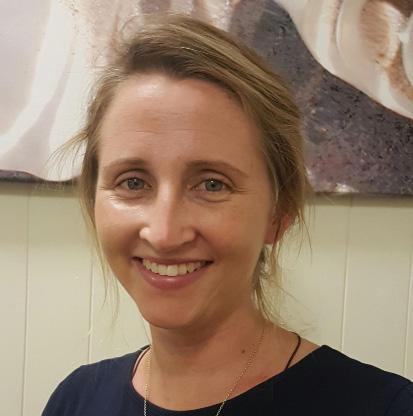
At Kumon, students study worksheets on a daily basis. This enables children to develop a daily study routine that builds discipline. Children are encouraged to study every day at the same time and same place that enhances discipline further. This allows children to be self- driven, responsible and consistent. Kumon aims to develop healthy habits from a young age that builds selfconfidence, helps overcome challenges and enjoy learning. My experience at Kumon tells me that children who adapt to the daily study routine show consistent growth and are driven to succeed in whatever they pursue.
I believe that every child has limitless potential. In order to fully develop their potential, they need quite amount of practice and consistency in their daily study. I think to do something consistently and repeatedly, which I consider it as “habit” is not such an easy thing to do. During the process we have to encouter with many obstacles, such as: student’s sickness, examination, holiday, unstable mood, etc. I always encourage my student and then communicate it with their parents about the importance of consistency in their study. That inludes students’ regular attendance in Kumon and do their kumon homework daily. The result is students will not only have a good academic ability, but they will also have a good study habit, a good time management, responsibilty and selfsufficiency. That will be such strong foundation for their future.



Kumon is a learning programme based on each student’s individual ability rather than age or grade, which allows them to potentially study at a higher level than their current grade or level. We believe that children can accomplish extraordinary things when they are supported by the proper tools, methods and guidance. Here are the awards and recognitions that Kumon students can achieve throughout the programme.

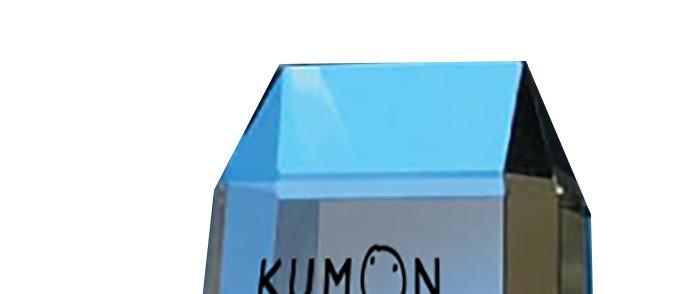
Kumon International Standard (KIS) is the global standard for a student’s grade level. As there are many different types of school systems and curriculums around the world, KIS serves as a global standard that would provide a uniform benchmark for the Kumon curriculum.
Advanced Student Honour Roll (ASHR) recognises and celebrates children studying above their school grade level. Students can receive a variety of achievements throughout their time in the programme.
Bronze Medal: Completed study materials that are approximately six months to one year ahead of KIS, based on the student’s grade level.
Silver Medal: Completed study materials that are approximately two years ahead of KIS, based on the student’s grade level.
Gold Medal: Completed study materials that are approximately three years ahead of KIS, based on the student’s grade level.

Trophy: Completed study materials that are approximately five years ahead of KIS, based on the student’s grade level.



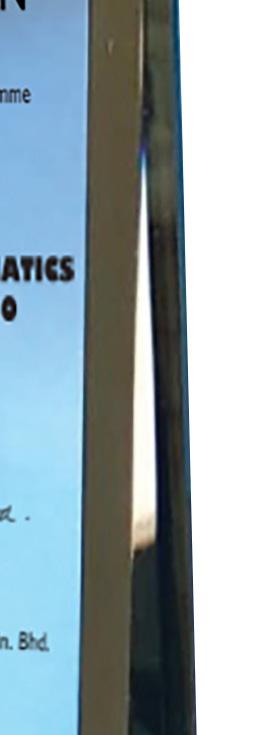
When a student completes their Maths or English programme, they will receive an award for each completed subject, which is the highest achievement they can gain through the Kumon Programme. For the Maths programme, this award is presented to students who have completed Maths Level O200. By the end of the programme, they will have a solidunderstanding of advanced differentiation/integration and how to apply these skills.
For English as a Native Language programme, this award is presented to students who have completed Level L200. By the end of Level L200, students will have a deep understanding of the elements of literature, substantiate interpretations of passages and further enhance their ability to read critically. Lastly, for English as a Foreign Language programme, this is presented to students who have completed Level O200. By the end of Level O200, students will acquire a solid skill in reading comprehension and a broader their vocabulary.

1. Getting your children involved
Sit your children down at a place that is free from distractions. Get them to list down the daily activities that they need to put into the daily routine, which could include meal times, nap and bedtime, school homework, Kumon time, music and sports practice.
2. Assigning the time and duration
After deciding on the activities, discuss with your children on the duration to set aside for each task, adding in a little buffer to cater for activities overrunning the time allocated. The buffer could be used as a reward for extra play or screen time as a reward for completing the activities punctually.

3. Put the activities and time slots into a schedule
You can choose to DIY this – another opportunity for bonding – using recycled or scrapbooking materials, or even toys such as magnetic tiles. This helps to reinforce the various activities against the allocated time.
4. Display the schedule prominently
This acts as a source of reference for your children and yourself to refer to (and countering the forgetting curve). It could be on the wall, or if you had chosen to use magnetic toys or materials, then the fridge or on something that conducts magnetism well.
5. Have a clock
Having a clock helps to remind your children that it is time to transition to another activity. No more excuses for not knowing the time! This can be an analogue or digital clock. For younger children, a digital clock could be helpful.
6. Be patient and encouraging
Don’t expect the schedule to run smoothly from the get-go, as children will take some time to get used to it. You can remind them of the schedule in the beginning, and encourage them to keep to the schedule.
You might even want to reward them with extra activities that are not listed in the timetable, like extra time to read, or a trip to the playground or supermarket, for taking the initiative to complete the task punctually.
7. Be flexible
Exercise some flexibility with the timetable if there was a family outing oroverseas trip. For example, many Kumon parents would let their children complete their Kumon homework in the morning during overseas trips, festive occasions or when there are family outings planned.
“We are what we repeatedly do. Excellence, then is not an act, but a habit.” - Aristotle
